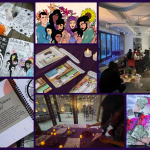 Across the globe, there’s growing recognition of the value of nonprofits and volunteers joining with corporations and governments to solve social issues. Last month, I was honored to participate in a conversation about the most effective ways those sectors can come together at the inaugural Service Innovations Summit in Madrid. The international summit was co-hosted by the U.S. Ambassador to Spain, Alan Solomont, the Rafael del Pino Foundation in Madrid, and the Meridian Center in Washington. The summit brought together the corporate sector, foundations, and NGO’s from Spain, a handful of other European countries, as well as the US to share information and best practices related to volunteering, corporate social responsibility, and public-private partnerships. Being in Madrid added a sense of urgency to the summit: in Spain, one-in-four people is unemployed (one-in-two people under the age of 25 is unemployed) and in the middle of the conference there was a one-day negotiated general strike across the country to protest recent labor law changes that made it less costly to hire and fire workers.
Across the globe, there’s growing recognition of the value of nonprofits and volunteers joining with corporations and governments to solve social issues. Last month, I was honored to participate in a conversation about the most effective ways those sectors can come together at the inaugural Service Innovations Summit in Madrid. The international summit was co-hosted by the U.S. Ambassador to Spain, Alan Solomont, the Rafael del Pino Foundation in Madrid, and the Meridian Center in Washington. The summit brought together the corporate sector, foundations, and NGO’s from Spain, a handful of other European countries, as well as the US to share information and best practices related to volunteering, corporate social responsibility, and public-private partnerships. Being in Madrid added a sense of urgency to the summit: in Spain, one-in-four people is unemployed (one-in-two people under the age of 25 is unemployed) and in the middle of the conference there was a one-day negotiated general strike across the country to protest recent labor law changes that made it less costly to hire and fire workers.
I was invited to the summit to share some of my experiences and perspectives of service and volunteering from my years at the Corporation for National and Community Service, as well as great examples of some of The Women’s Foundation’s grantee partners, like A Wider Circle, who engage all levels of volunteers as part of their business models. And I was able to connect with some of the nonprofits in Spain that provide important services to women and girls during these times of increasing need.
It was interesting to learn that Spain’s history and social and cultural norms have resulted in the government playing a significant role in funding for and solving social issues and, in many cases, limited the ability of NGOs and individuals to step in when there is a void. As a fairly new democracy, the idea of voluntary “citizen service” is also relatively new and many participants in the summit were excited about the idea of spurring innovation and creative solutions to the challenges Spain is facing. It is also worth noting how powerful a force family is in Spain – that one’s family is the major source of support, comfort, and sustenance when needed.
As enamored as I was with the city of Madrid, its history, art, culture, fashion, architecture, and food (funny how quickly I adapted to dinner at 10 pm!), I was even more enamored by the sense of optimism of the people I met – people who are determined to address the difficult economy the country is facing with renewed focus on the power and potential of nonprofits, foundations, corporations, volunteers, philanthropy, and the government collaborating in new ways and learning from each other – both within Spain and across the world. As so many countries struggle to recover from economic downturns, it will be more important than ever for us to have gatherings like the Service Innovations Summit that facilitate the sharing of ideas and resources to ensure that all sectors are working as effectively as possible.
Nicky Goren is president of Washington Area Women’s Foundation.



